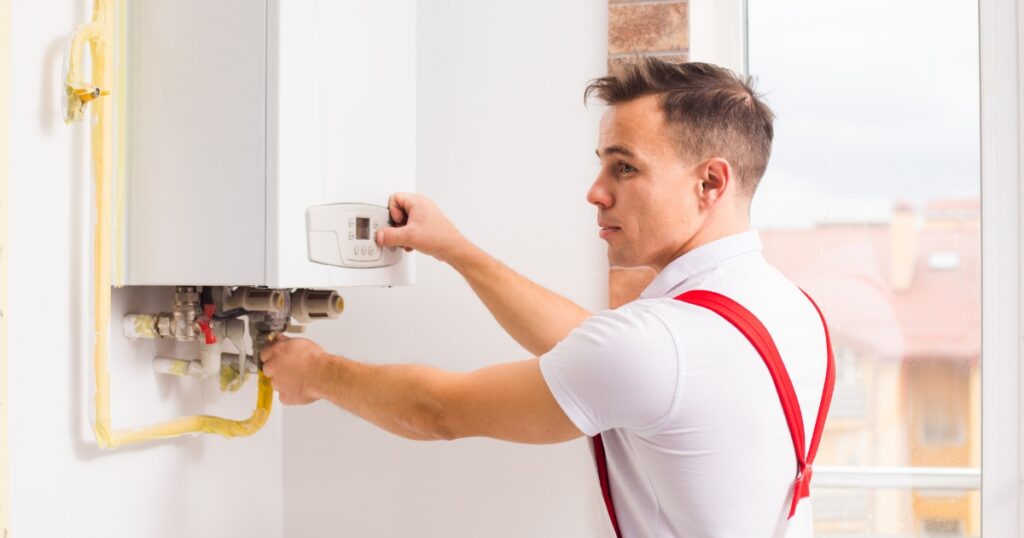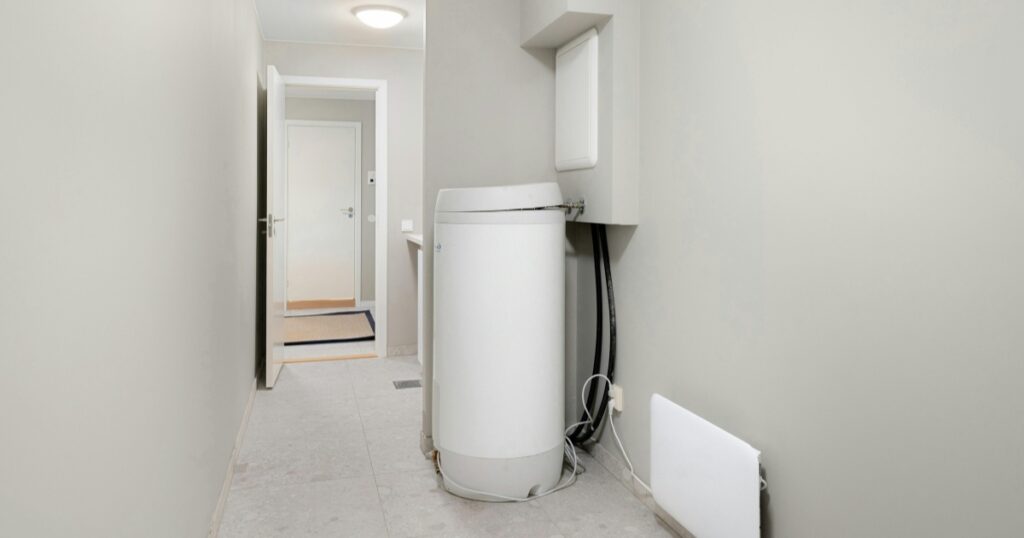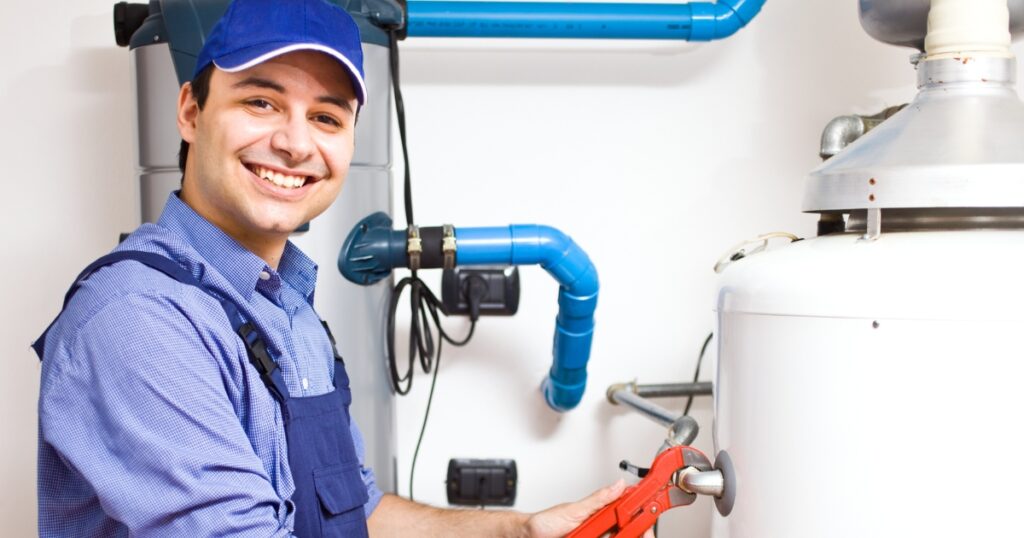Have you ever stumbled out of bed, only to find your thongs floating in a pool around the hot water system? It’s an Aussie nightmare we’re all familiar with, and it can take the good right out of your morning.
Would you believe that leaks can be caused by something as minor as a wobbly pipe or get as complicated as faulty pressure relief valves? So, let’s rip into this blog post where we’ll guide you through figuring out where that pesky leak is coming from, the usual culprits behind these types of leaks in your hot water heater repairs system and understand when it’s about time to ring up the professionals.
Key Takeaways
- Signs of a leaking hot water heater include water pooling or dripping around the unit and wet spots on the floor.
- To locate the leak, inspect the hot water heater for visible leaks and determine if it is coming from the top or bottom of the tank.
- When dealing with a leaking hot water heater, turn off the water supply, call a professional plumber, and consider turning off the power source if necessary.
- Common causes of hot water heater leaks include a damaged tank, faulty pressure relief valve, and loose or leaking pipe joints.

How to Identify and Locate the Leak
To identify and locate a leak in your hot water heater, start by checking for signs of water pooling or dripping around the unit. Inspect the hot water heater closely for any visible leaks, including looking for puddles or wet spots on the floor.
Determine whether the leak is coming from the top or bottom of the tank to help determine the cause and necessary repairs.
Check for signs of water pooling or dripping
First, let’s make sure to carefully examine the area around your hot water system. Look for any signs of water pooling on the floor or dripping from the tank itself. This can indicate a leak even if you don’t see one directly.
Be thorough because some leaks are small and hard to spot right away. It’s best to check for these signs during a period of non-use when there won’t be much disturbance in the surrounding area.
Mold growth, peeling paint or wet spots on adjoining walls may also signify leakage issues which should prompt immediate action to prevent further damage and costly repairs down the line.
Inspect the hot water heater for visible leaks
Upon discovering a leaking hot water heater, it is crucial to inspect the system for any visible leaks. This step involves closely examining the unit to identify any signs of water pooling or dripping.
Look out for wet spots or moisture around the tank and its fittings. Check if there are any obvious cracks or holes in the tank itself. By conducting a thorough visual inspection, you can locate the source of the leak and determine an appropriate course of action to address the issue promptly.
Remember that a leaking hot water heater may indicate internal problems with the tank itself, such as a damaged pressure relief valve or loose pipe fittings. Regularly inspecting your hot water system can help prevent leaks and potential damage down the line, potentially saving you money on repairs.
If you notice any visible leaks during this inspection process, it is advisable to seek professional assistance from a qualified plumber who can further assess and recommend necessary repairs or replacements based on their expertise.
Determine if the leak is coming from the top or bottom of the tank
To address a leaking hot water heater, it is important to determine if the leak is coming from the top or bottom of the tank. This will help in identifying the specific issue and finding an appropriate solution.
Leaks from the top of the tank could be caused by a faulty anode rod, loose pipes, or a leaking valve on the cold water pipe. On the other hand, leaks from the bottom may indicate more serious problems such as a damaged tank.
By determining where exactly the leak is coming from, you can take effective steps towards resolving it and preventing further damage to your hot water heater system.
Steps to Take When Dealing with a Leaking Hot Water Heater
To address a leaking hot water heater, the first step is to turn off the water supply and then call a professional plumber for assistance. If necessary, also consider turning off the power source to ensure safety.
Turn off the water supply
To address a leaking hot water heater, the first step is to turn off the water supply. This will prevent any further damage and minimize the risk of flooding or additional leaks. Locate the shut-off valve near your hot water tank and close it tightly in a clockwise direction.

By doing this, you can stop the flow of water to the tank and begin addressing the issue at hand. Remember, turning off the water supply is an essential step that should be taken as soon as possible when dealing with a leaking hot water heater.
Call a professional plumber
If you’re dealing with a leaking hot water heater, it’s important to call a professional plumber right away. While there may be some quick fixes for certain leaks, more complex repairs or part replacements should be handled by an experienced plumber.
They have the knowledge and expertise to accurately diagnose the issue and provide the necessary solutions. Plus, trying to fix the problem yourself could potentially make matters worse and result in additional damage or even safety hazards.
So don’t hesitate, to reach out to a trusted professional plumber who can help get your hot water heater back in working order.
Consider turning off the power source if necessary
If you notice a leak in your hot water heater, it’s important to consider turning off the power source if necessary. This will help prevent any electrical hazards and ensure your safety during repairs or when calling a professional plumber.
It’s always better to be cautious and take these extra steps to avoid any potential accidents or damage. Remember, safety should always be the top priority when dealing with a leaking hot water heater.
Common Causes of Hot Water Heater Leaks
Some common causes of hot water heater leaks include a damaged tank, faulty pressure relief valve, and loose or leaking pipe joints. If you want to learn more about these causes and how to prevent them, keep reading.
Damaged tank
If you notice water pooling around your hot water heater, it could be a sign of a damaged tank. A damaged tank can lead to leaks and potentially cause more serious issues if not addressed promptly.
It is important to take action and have a professional plumber assess the situation. They will be able to determine if the tank can be repaired or if it needs to be replaced altogether.
Remember, addressing a damaged tank early on can help prevent further damage and save you from costly repairs in the long run.
Faulty pressure relief valve
If you notice water leaking from your hot water heater, a faulty pressure relief valve could be the culprit. The pressure relief valve is responsible for releasing excess pressure inside the tank to prevent it from bursting.
If this valve is not functioning properly, it can cause water to leak out. To fix this issue, you may need to replace the faulty pressure relief valve with a new one. It’s important to address this problem promptly as a leaking hot water heater can lead to further damage and increase the risk of potential accidents or costly repairs in the future.
Regularly inspecting and maintaining your hot water system can help prevent issues like a faulty pressure relief valve. Consider hiring a professional plumber who specializes in hot water heater repairs to ensure proper installation and replacement of any faulty components.
Loose or leaking pipe joints
We found that loose or leaking pipe joints can also be a common cause of hot water heater leaks. Over time, the connections between the pipes can become loose and start to leak. This can result in water pooling around the area or even dripping from the joints themselves.
It’s important to check these joints regularly for any signs of leakage and tighten them if necessary. Hiring a professional plumber may be needed if the issue is more complex or widespread.
Regular maintenance and inspection of your hot water system can help prevent these issues from occurring in the first place, saving you time and money on potential repairs down the line.

Repair or Replace: Making the Decision for a Leaking Hot Water Heater Repairs
When faced with a leaking hot water heater, it is important to carefully evaluate whether repair or replacement is the best course of action. Consider factors such as the age and condition of the unit, weigh the cost of repairs against a new installation, and seek guidance from a professional plumber to make an informed decision for your home’s hot water needs.
Evaluate the age and condition of the hot water heater
To determine whether to repair or replace a leaking hot water heater, it’s crucial to evaluate the age and condition of the unit. Older water heaters are more prone to leaks and can have worn-out components that may be difficult or costly to fix.
Consider how long you’ve had the hot water heater and if it has been regularly maintained. Additionally, assess its overall condition – any signs of rust, corrosion, or excessive wear indicate potential problems.
By evaluating these factors, you can make an informed decision on whether repairing or replacing your hot water heater is the best course of action.
Consider the cost of repairs versus replacement
When dealing with a leaking hot water heater, one important factor to consider is the cost of repairs versus replacement. Assessing the extent of the damage and weighing it against the expense of fixing or replacing parts can help you make an informed decision.
A professional plumber can provide expert advice on whether repairs are possible and cost-effective in your specific situation. It’s also essential to evaluate the age and condition of your hot water heater.
Older units may have additional issues that could arise down the line, making replacement a more viable long-term solution. By considering these factors, you can determine whether investing in repairs or opting for a new hot water heater would be the most practical choice for your home.
Consult with a professional for expert advice
If you’re dealing with a leaking hot water heater, it’s always a good idea to consult with a professional for expert advice. They will have the knowledge and experience to properly assess the situation and provide guidance on the best course of action.
Whether it’s a simple repair or if the entire system needs to be replaced, consulting with a professional plumber can help ensure that the issue is resolved correctly and efficiently.
Don’t hesitate to reach out for assistance when dealing with a leaking hot water heater – their expertise can save you time, money, and further damage down the line.
Get Your Hot Water Flowing Again, Today!
Don’t let a leaking hot water heater dampen your comfort – take swift action with Hot Water Repairs Today! We specialize in prompt and reliable repairs to address leaks before they become a major issue. Contact us immediately if you notice water pooling around your hot water heater or any signs of leakage. Trust Hot Water Repairs Today to be your go-to partner in restoring your hot water system to its leak-free best. Don’t wait for water damage to escalate – reach out now and address leaking issues with confidence. Act today for a dry and reliable hot water supply. Contact us now!






